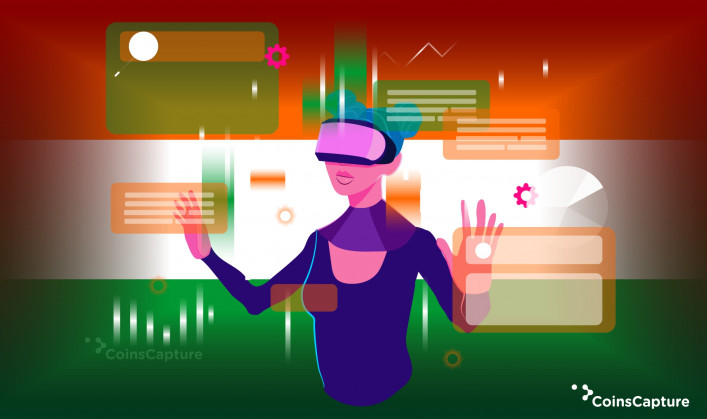7 November 2025
India’s Involvement in the Metaverse
There is an extensive ongoing discussion on how to describe the Metaverse since it is such a novel idea. Despite this, all interpretations agree that XR, a mixture of augmented, virtual, as well as mixed reality settings which are available and participatory in actual-time will serve as the portal to the Metaverse. Such innovations in technology have paved the way for new uses in many industries, from gaming and entertainment to corporate solutions and simulations and the military and defence sectors. It is also anticipated that blockchain technology will play a significant part in the development of the Metaverse since it enables digital asset ownership claims to be verified and transfers to be made. The hope is that by combining XR with blockchain, we may build apps that allow us to seamlessly switch between our virtual as well as real selves, opening up novel possibilities for social and financial engagement.
Also Read: 7 Best Metaverse Influencers To Follow On Social Media
Primed for Metaverse
With an almost 40-place jump in the global innovation index from 2015, India is currently ranked 46th. The entrepreneurial culture in India is also flourishing and has seen a lot of development lately. Only the United States and China produced more "unicorn" startups this past year than India did, with 42 companies reaching a valuation of $1 billion or more. A number of positive consumer trends, such as increased smartphone use and cheap cellular data, contribute to this favourable setting. The nation's mobile phone revolution, which began in the late 1990s, is only one example of how it has accelerated development and economic growth by leapfrogging to new technology.
Also Read: 17 Best Bitcoin Lending Marketplace Of 2022
In the recent decade, a number of technological initiatives in India have come together to usher in a new age of financial inclusion. These initiatives, known together as the India stack, include the national digital identity and payments infrastructures. A big and rapidly expanding youth population is driving India's rapid expansion into the virtual realm. The majority of this group has extensive experience with gaming as well as socialising in virtual spaces. A new indicator devised by the RBI to track the spread of digital payments throughout the nation shows a steep increase in their use: 75% from September 2019 to September 2021.
Analysts estimate that only by 2026, India's gaming business would have grown by a factor of over three, reaching $7 billion. This growth has been fueled in large part mostly by the nation's rapidly expanding middle class. The pandemic is a prime example of how the rise of video games has increased demand for transmedia storytelling. Several gaming platforms now provide virtual stages for concerts, exhibitions and brand promotion, normalising the idea that social and cultural experiences take place exclusively in person.
Regulatory Landscape
However, despite what seem to be adequate technological, demographics, as well as regulatory underpinnings in India for the Metaverse, the practical problem of establishing the Metaverse persists. Increased private-sector transaction activity is necessary for India to assume a leadership position. So far, there are encouraging signs that this will be the case; more than $1 billion in capital was invested in the regional video games environment in the 18 months leading up to August 2021, which is greater than in the previous 5 years put together. Meanwhile, India, like several other nations, is discussing how to effectively manage the technology that will underlie the Metaverse. Money made from selling Virtual Digital Assets (VDAs) such as Cryptocurrency and maybe even NFTs is subject to a 30% tax under the most recent Union Budget. Taxing Cryptocurrencies could suggest that governments recognise them as a regulated asset, whereas it wouldn't legitimise Cryptocurrency ownership.
The evolution of the Metaverse will be affected by the widespread belief that NFT ownership and trade would lead to a new digital world. A non-fungible token is a digitally protected claim to ownership of a distinct, non-interchangeable virtual commodity that may strengthen the bonds between offline as well as online business activities. A musician, for instance, may write music, distribute it virtually as that of an NFT, and include a mechanism via which the composer would get a royalty payment for each transaction. To the extent this is implemented, it has the potential to provide long-term financial support for artists by guaranteeing that they would always earn money from the sales and use of their creations.
Meta-Governance
These discussions are wrapped up in a larger argument over how interoperable the Metaverse should or even could be inside the business world. There have been many proposals for open standards in the Metaverse, however the rewards for accepting them seem to be overwhelmed by the desires of certain technological corporations to preserve control. Moreover, the idea that a lack of uniformity in regulatory policy may render interoperability moot is receiving less consideration. Is a unified Metaverse really viable if regulations for monetizing and regulating it vary from country to country?
This is shown by the several perspectives on internet regulation in the present day, which were summarised by a technology expert named Benedict Evans. It wasn't until lately that anything other than Western-founded businesses, goods, standards, and regulations were given any serious consideration for inclusion in policy making. Yet as software as well as businesses proliferate globally, so too does the scope of applicable laws and policies.
The Bottomline
This is a positive trend since governments are often blamed for reacting slowly to the effects of new technology on industry, community, as well as politics. With global best practises informing important policy choices, the landscape of Indian digital governance and regulation is sure to change.
Disclaimer: The author’s thoughts and comments are solely for educational reasons and informative purposes only. They do not represent financial, investment, or other advice.






